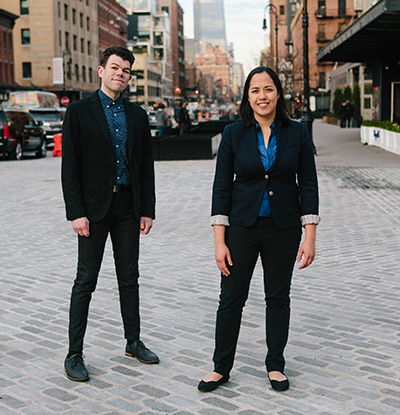ASU music professor wins grand prize in 'Impact Performance' competition

Michael Compitello
New Morse Code, a group co-founded by Arizona State University School of Music, Dance and Theatre Assistant Professor Michael Compitello, recently won the grand prize in the Ariel Avant "Impact Performance" competition, designed to “generate productive conversation and offer positive means of action around a social justice issue.”
The percussionist formed New Morse Code with cellist Hannah Collins to create an innovative hub for the performance, commissioning and promotion of new music that engages with community.
“We try to take on projects where we can do something more than just play a concert,” Compitello said. “We have been thinking a lot about how music and musicians can engage in some of the larger social issues – from the environment to social injustice.”
For the competition, New Morse Code had to submit plans for a concert with a new composition on sustainable development goals about how people can engage with the world for better management of the Earth’s resources, such as clean water and renewable energy, or global issues, such as climate change and food shortages.
Their performance project, “The Language of Landscapes,” features the works of Christopher Stark and Viet Cuong, a new 30 foot commissioned work by Andy Akiho, and a New Morse Code engagement event, “Language & Landscape: A Sonic Exploration of Human Interaction with the Natural World.” The award funded commissioning for the new works from Cuong and Akiho and includes a $20,000 prize.
New Morse Code will tour five performing arts venues in March 2022, pairing concerts with community engagement activities around climate action. Performance venues include the Newman Center for the Performing Arts at the University of Denver, Dayton ArtsLIVE at the University of Dayton, the Virginia Arts Festival, the Lied Center of Kansas, and the Lumina Festival of the Arts at University of North Carolina, Wilmington.
The duo develops long-term collaborative relationships with composers, and in 2014, they received a grant from Chamber Music America to commission the “The Language of Landscapes” from Stark.
Since Compitello is from Arizona, Stark is from Western Montana and Collins is from upstate New York, they decided to make field recordings of trees and water interwoven with live instruments to create a contrast between acoustic and artificial. Collins plays the cello and Compitello plays only discarded objects on the piece.

ASU Assistant Professor and percussionist Michael Compitello and cellist Hannah Collins comprise the musical group New Morse Code.
The duo has also been working for a number of years with composer Andy Akiho, who is interested in space exploration, particularly NASA’s OSIRIS-REx mission, which landed a satellite on an asteroid. Akiho’s commissioned piece will be about the possibilities of space exploration.
Cuong will write a work for the duo with a focus on renewable energy and water.
“Because musicians are great at focusing attention, we want to know what scientists want attention focused on,” Compitello said. “Our goal is to talk to a number of members of the scientific community and see what we can do to amplify their voices about what they say is really important.”
During the tour, the duo will conduct community engagement activities in rural Indiana near each performance location to gather sounds with community members that will be incorporated into pieces that will be workshopped during their Indiana University fall 2022 residency.
In their pursuit of telling stories of real people and amplifying interesting or unique voices, New Morse Code also became involved with a new one-woman opera, “dwb (driving while black).”
Written by composer Susan Kander, and librettist and soprano Roberta Gumbel for New Morse Code, the chamber opera focuses on a mother teaching her African American son to drive in a world where that can be very dangerous.
The story is a contrast between the mother's experiences and the news bulletins that tell real stories about things that have happened to African Americans due to interactions with the police. The work includes a single voice, cello and percussion.
Premiered in Kansas in 2018 with performances and roundtable discussions, the work served as the beginning of a conversation between police and community activists during the Kansas City protests.
“It has been inspiring to see how audience members have found relationships with and seen themselves in all parts of the story,” Compitello said.
With live performances canceled in March 2020 due to COVID-19, a studio version of the work was filmed with Four/Ten Media and paired with roundtable discussions on racial bias and social justice. The project, featured in the Washington Post, was streamed live in several locations, including a weeklong virtual run hosted by New York’s Baruch Performing Arts Center and Opera Omaha in October 2020.
The audio recorded for the film was released as a CD on Albany Records. Compitello said the future plan is for new artists to start performing the piece.
“Both of these projects come from a similar energy of us wanting to break out of the traditional concert setting and engage with other communities,” Compitello said. “It's a time of extreme reflection and change, of anger and sadness, and we both had the commitment, as people, (to ask), ‘What can we do right now?’ and ‘Whose story can we help amplify?’”
More Arts, humanities and education

ASU professor's project helps students learn complex topics
One of Arizona State University’s top professors is using her signature research project to improve how college students learn…

Award-winning playwright shares her scriptwriting process with ASU students
Actions speak louder than words. That’s why award-winning playwright Y York is workshopping her latest play, "Becoming…

Exceeding great expectations in downtown Mesa
Anyone visiting downtown Mesa over the past couple of years has a lot to rave about: The bevy of restaurants, unique local shops…

